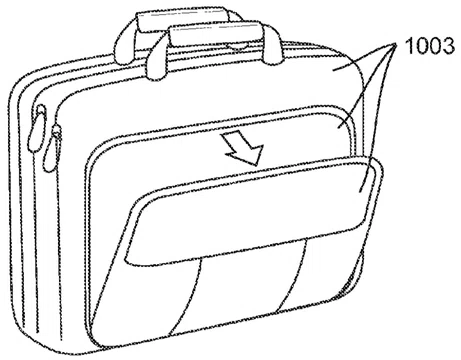Judge Andrews today released a claim construction regarding several computer bag claims. Six of the claims at issue included elements regarding orientation of the opening in a computer bag:
“[pouch] opening[s] [is/are] . . . oriented in a direction substantially parallel to the planar surface”

He found the claims indefinite because a POSITA would not understand the "orientation" of a bag opening, and the specification and prosecution history offered no hints:
At oral argument, [defendant] Victorinox contended that it is impossible to choose between two plausible views as to how to identify the orientation of the pouch opening; the “planar view” articulated by Victorinox and the direction pointing out of the pouch through its opening asserted by [plaintiff] Targus. . . .Upon my review of the specification and claim language,[] I agree with Victorinox’s position. The specification is no help. It does not use “orient” or “oriented” or any similar word. It does not use “parallel,” “pouch opening,” or “direction” anywhere but in the claims. It offers no indication of how to identify the orientation of the pouch opening. It might be simple enough to identify the orientation of the pouch itself, or the objects contained therein, but, at oral argument, Targus rejected the view that the orientation of the pouch or its contents determined the orientation of the pouch opening. . . . Despite Targus’ proffered explanation, I cannot identify any language in the claims or anything else that indicates that a POSA would understand “oriented” in this context to mean the view of “an observer sitting inside the bag looking out through the opening.”
He held that the claim language was indefinite, but deferred discussion of further consequences until summary judgment:
Thus, despite helpful oral argument and my review of the intrinsic evidence, I am unable to construe the term. We can address the consequences of this ruling in connection with summary judgment.
The summary judgment deadline in the case isn't until November according to the docket, but there are other claims at issue as well, so the case would continue regardless.
Defendant Proposed No Alternate Construction
It's not unusual for Judge Andrews to address indefiniteness at Markman, but defendants often debate whether they should offer an alternative/"backup" position, or should instead essentially concede that if the claim is not indefinite then the other side's construction is correct.
I've seen it work both ways, and and the answer depends on the circumstances of the case (including which judge is handling claim construction). Here, the defendant went all-in, proposing no alternate construction other than indefiniteness, and it obviously worked out for them.
If you enjoyed this post, consider subscribing to receive free e-mail updates about new posts.





